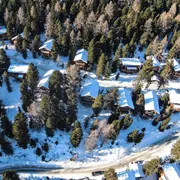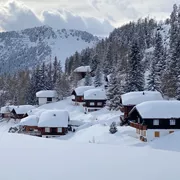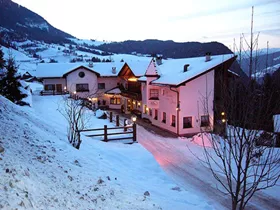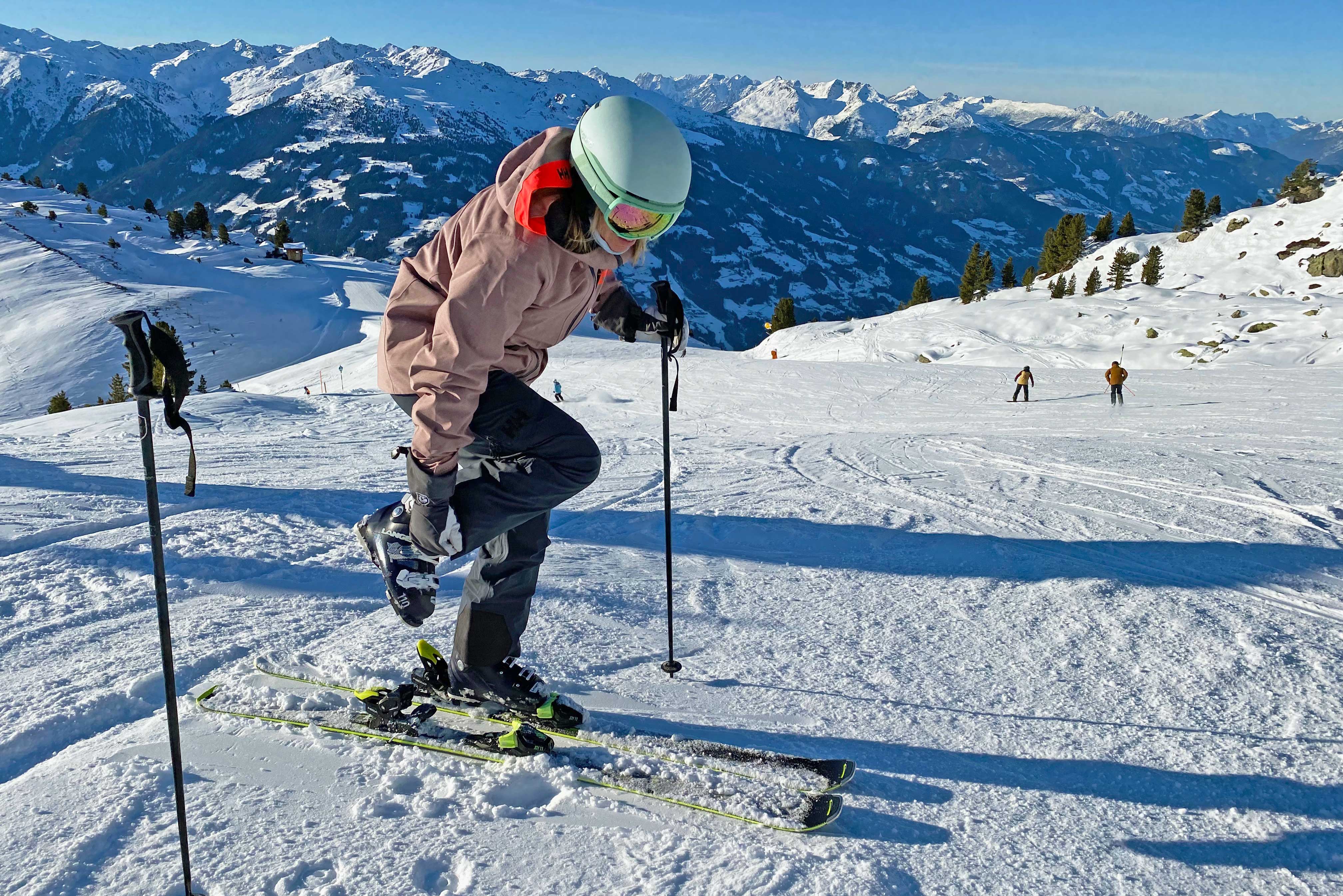

Only some people grow up on the slats from an early age, so many adults still need or want to learn to ski later in life. For some, no problem, while others may think, "Can I still do that?!" or "I might break a leg. I'm not sporty at all!". While I understand the doubts, I can also confidently say: you are never too old to learn to ski! In this article, I explain how you can still learn to ski as an adult, answer the most frequently asked questions and tell you why learning to ski is so much fun even when you are older.
As an adult, why would I still want to learn to ski?
There are many reasons why you might want to learn to ski later in life. For example, you find a partner who is a ski fanatic. Or after all these years, you want to join the family or group of friends, or simply because your children and grandchildren ski and it looks so great. Of course, there can be embarrassing and hilarious situations when you are on skis for the first time. Still, the vast majority of novice skiers are usually instantly taken. Skiing and winter sports are great fun and incredibly addictive
Of course, as an adult, you could choose hiking or cross-country skiing instead, which are also wonderful but give learning to ski a chance. As a ski instructor, I have taught many adults to ski. These included both young and athletic persons and people who were already quite elderly and did not get much exercise in daily life. Almost all of them were raving after an hour or a few days. And above all: super happy that they could do it and discovered how happy skiing makes you!
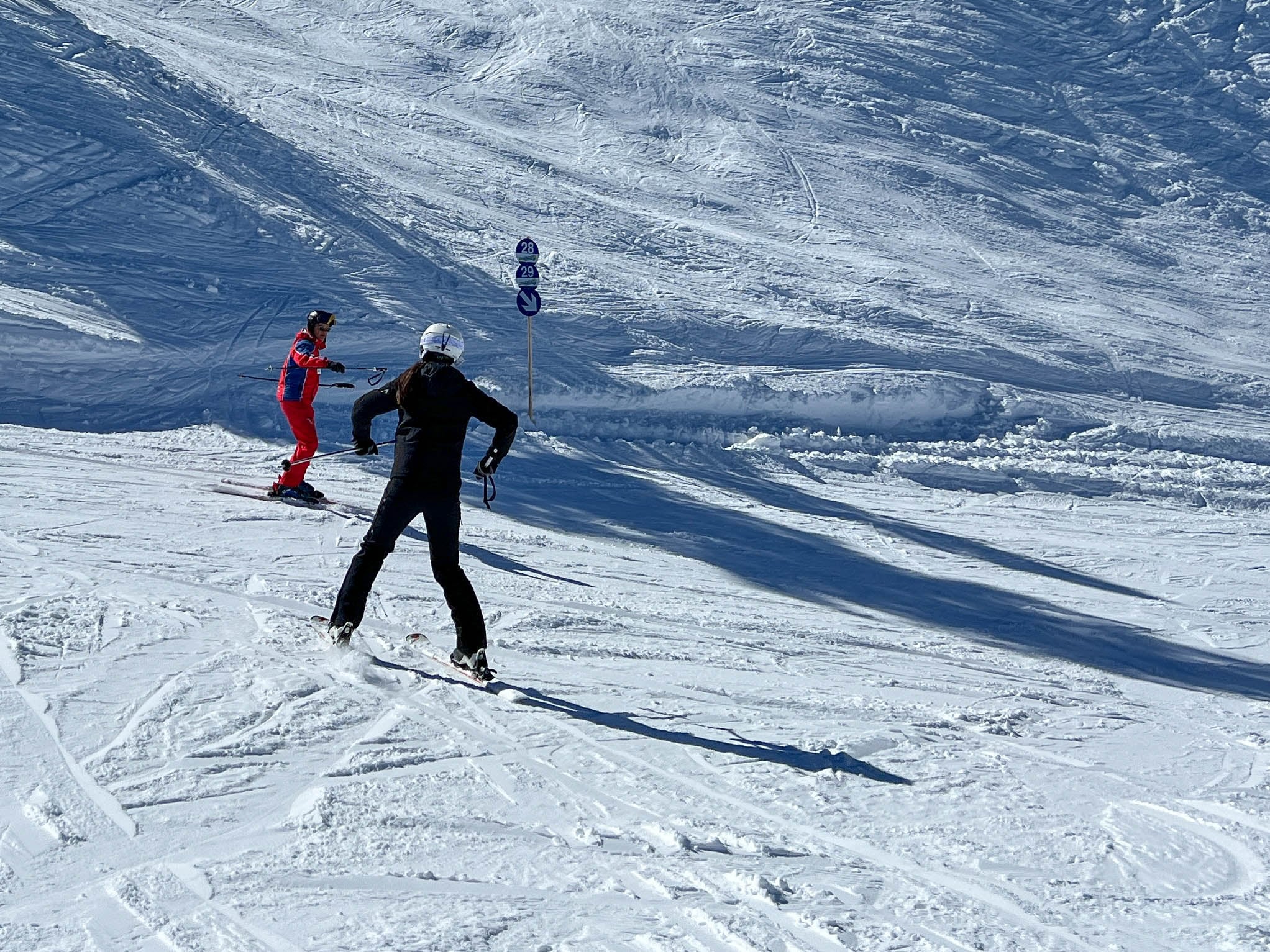
As an adult, how can I learn to ski?
Always take lessons at a recognised ski school with qualified ski instructors when you want to learn to ski as an adult. You might know several people who say they are willing to teach you during the holidays. But learning the proper technique in the correct order, taking into account your level and ability, is a real skill. So don't be persuaded to try it once at an indoor ski centre with that lovely friend, but take ski lessons from a professional. Learning skiing the right way from the start will be a lot safer and, most importantly, more fun.
Taking lessons can be done in a group or privately, whatever you find more comfortable. A ski instructor builds up the basics of skiing step by step and adjusts their lesson to the level of the group or person. Not everyone learns at the same pace, so be patient and open to something new. You will eventually get it right and glide down the slope in a calm and controlled manner.
Where is the best place to take lessons?
You can take ski lessons both in the UK and in the Alps. If you have the time, inclination and money, start at home. Of course, you'll miss out on the magic of snow and mountains, but it's nice to lay a foundation before you go to the snow. And, also convenient: in your mother tongue! In the UK, you can take lessons at an indoor ski slope, a conveyor slope, or on a dry slope. Skiing on an indoor ski slope is probably most similar to skiing in the real mountains. Yet, the other options are also hugely effective for mastering basic skiing techniques. If you start learning the basics in the UK, you will be able to hit the slopes during your winter holidays sooner. Moreover, you already train your muscles and condition at home, making it easier to keep going during your holiday. If you find taking lessons in the UK too onerous, you can sign up at the ski school during your holiday. Here you will start learning the equipment and basics, and you will still be gliding down the slopes calmly after a few days.

How athletic should I be?
Not everyone is equally athletic or learns new skills quickly. Of course, it helps when you want to learn to ski that you have a good basic fitness level and exercise or practise a sport regularly at home. But it is no prerequisite for learning to ski as an adult. I have taught plenty of people to ski who, in their daily lives, were mainly on the couch, in the car and the office. No problem. Even then, you can take ski lessons and glide down the mountain after a few days. Only you will find that you are out of breath faster, and it would be nice if you had more muscle power.
What do I need?
To ski, you need basic equipment. This includes a ski jacket, ski trousers, ski socks, gloves or mittens, the right underwear, a ski helmet, skis and ski poles. Complete ski equipment costs a fair bit of money, so it is advisable first to borrow items such as a ski jacket, ski trousers, gloves and ski socks. Wait to buy skis and ski boots. Go skiing for a few years first. Can't borrow anything, or you would rather not? Stay away from splurging on the most expensive gear.
Take care: when borrowing skis or ski boots from someone, they are suitable for beginners. Learning to ski on advanced material will only hinder your development. This material is often too stiff and rigid for a beginner to make his first turns quickly.

When can I go off a blue, red or black piste?
Descents come in different difficulty levels, with blue being the easiest, red somewhat more challenging and black the steepest. You have no business on a red or black piste as a beginner, but when will you? Well, that is entirely up to you, your ambitions and your ski level. After the practice area, where you will learn the basics, you will start on the blue piste anyway. For a red slope, you need more experience and should be able to ski parallel. Most people reach this level only in the second week on skis, and if you have the aptitude, a little earlier. You need much more practice to ski safely and smoothly down a black run. You should be able to ski off a red piste without difficulty before you should venture onto the black. Unfortunately, many people are impatient, so you regularly see winter sports enthusiasts fumbling and standing on a black run with trembling knees. I advise taking lots of ski lessons and working on your ski technique. That way, you will have the most fun and build up your confidence.
How often will I fall, and am I likely to break something or suffer an injury?
Everyone has heard stories of broken legs, torn knee ligaments or other injuries sustained during winter sports holidays. As a ski instructor, my experience is that many beginners do not fall in the first days of their skiing career. Or if they do, it is usually controlled and gentle, resulting in relatively few injuries among beginners. However, getting back up when you have fallen can be tricky, but it usually results in mostly funny situations. Of course, for both children and adults, skiing is not without risk. There are plenty of hospital visits yearly for beginners and advanced skiers alike. Fortunately, the equipment is so good nowadays that leg fractures and knee injuries are much less common than in the past. In short, skiing may not be completely harmless, but the risk of sustaining an injury while skiing is manageable.

What level can I attain if I learn to ski later in life?
'What level would I like to achieve?' is the question every adult who is going to learn to ski should ask themselves! Are you satisfied if you can ski well and properly down a blue and a red piste, or are your ambitions much higher? A few years ago, I met someone during an off-piste weekend who had been on skis for 'only four years'. I was surprised because before you can go off-piste skiing, you must have mastered skiing quite well. After asking a few more questions, the lady in question turned out to have taken a lot of skiing lessons and skiing hours in those four years: twice a week on a conveyor slope and many hours in the snow in the Alps. So yes, this way, you learn to ski very well in a relatively short time. It's just how high you set the bar!
Just try it. Skiing is the most fun there is!
Hopefully, this blog answers the most important questions about learning to ski as an adult and clears any doubts. My advice is: are you considering learning to ski? Go for it! Book a trial lesson in the UK and experience what it is like to stand on the slats. And remember: it's even more fun in the real mountains! Or better yet, go with that group of friends, your (new) partner or family, and experience the feeling of being on skis in a beautiful winter landscape with snow-covered mountains. Afterwards, you'll probably love winter sports and skiing as much as we do!


